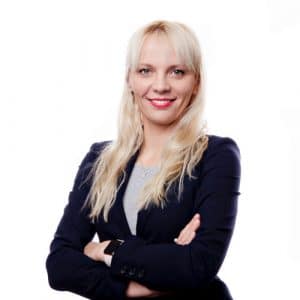Within the FX space, there are a number of personalities that stand out for a variety of reasons (some good, some bad). However, there are few that have attained the almost-legendary status of Natallia Hunik. The softly spoken but fiercely determined CRO of Advanced Markets surprised the FX world by announcing this week she is leaving for pastures new. Natallia was kind enough to grant Finance Magnates an exclusive interview to talk about her time in the FX industry, and, never one to shy away from giving her opinion, Natallia gave some forthright (would you expect anything less?) views on the industry. Enjoy!
Natallia, you are leaving Advanced Markets after nearly 7 years, why are you leaving?
I have reached a point where I think I have accomplished my mission at Advanced Markets. I’ve propelled the brand to the next level, built an amazing team globally, and helped the company to break into new segments of the market. It's time for me to move on and share my knowledge and passion for the financial markets elsewhere where my contribution can make a significant difference.
You are leaving behind the Forex /trading industry for something new. How difficult a decision was that for you?
I cannot say it was an easy decision, but I think it's the best decision at this stage of my career. While I won’t stay in the margin FX space, I will still remain in the broader financial services industry which will allow me to capitalize on my knowledge of financial markets and financial technology that I have gained in the last 15 years of my career.
And more importantly, it is my belief that you constantly need to learn and broaden your horizons. I do not believe you can do that by staying in the same space throughout your entire career. By learning the best practices, gaining knowledge of common mistakes, go-to-market strategies you become a well-rounded professional that can identify opportunities and areas for improvement quickly and effectively, and this is what makes you valuable to the organization.
As you look back on your time in the industry, what changes, good and bad, would you say have had the most impact?
There have been so many changes in the space, but when I look back, I think I can outline four general themes:
1) Changes driven by regulatory pressure.
When I started in the space, US FX brokers were thriving, then the focus had shifted towards the UK, then Cyprus and now offshore operations. All of that is driven by regulatory changes that brokers have had to adapt to.

Natallia Hunik, Chief Revenue Officer at Advanced Markets Group
Source: LinkedIn
The impact of regulatory changes is always twofold, on one side it's protecting investors, on another side, it pushes brokers to look for loopholes which in turn might not favor investors in the end.
2) Technology innovation
We have witnessed technology innovation of 2 types: a) driven by extreme market events and b) driven by user demand.
The first type has brought better Analytics , better backend processing and reporting, and the second type brought mobile applications, social trading and the emergence of some non-MT commercial platforms.
3) Growing multi-asset offerings
Largely due to lackluster FX volatility and an uptick in crypto as well as the pandemic-driven explosion of stock trading and before the introduction of fractional stock trading, FX brokers started expanding into different asset classes.
4) Increased risk-taking, the proliferation of the PFOF model
The mounting pressure from regulators and irrational markets forced many firms to increase their amount of risk-taking.
As many lacked the capital cushion and expertise, they started to rely a lot more on the emerging classes of retail market makers and PFOF arrangements (payment for order flow). While these practices have in many ways improved brokers’ operating margins, they certainly made their businesses as a whole less ‘investable’ due to the high-risk nature of this business.
In your time, you have cultivated almost legendary status for your forthright views, honesty and expertise. What have been the biggest personal challenges you have faced in the industry, and how did you overcome them?
Thank you for the kind words, I have been criticized sometimes for being too forthright and too honest:) Many have thought that I shouldn't have shared some of the industry’s inner workings. I have always been and will remain the biggest proponent of transparency in the financial markets. I believe that by empowering investors, brokers, hedge funds, traders and other market participants with information about the way the market operates, I have helped them to navigate the landscape better and make the right decisions for their businesses. And, this is what any company should be doing: solving problems, helping clients and not withholding critical information from them.
In your opinion, do women have a tougher time in the industry being heard and rising to the top?
I didn’t start at the top. I started as a ‘do it all’ customer service representative, account manager, project manager and a salesperson at Boston-based FX technology startup pitching for business and supporting a product in its initial stage around the clock, and I was under extreme pressure from powerful clients looking for their answers yesterday and pushing for immediate problem resolutions.
Making my way, often I was the only woman in the executive team, the only woman at the clients’ meeting and the first woman that men had ever seen in the management team of an FX company. That may sound challenging but it pushed me outside of my comfort zone and served as motivation to over-achieve and outperform.
I learned to use this to my advantage. Being the only woman in the room made me memorable.
That said, I see more women in the industry making great strides in taking on leading positions and breaking away from stereotypes. This is very inspiring, and as I meet female colleagues from the industry at various events, I always admire their calibre, character and charisma. The challenge for women in the financial markets and beyond is the lack of women role models in their space. Certainly, there are some high-profile FX women leaders out there that would make great role models. The industry needs to keep up with the diversity, and more successful female stories will give other women an opportunity to see a broad and diverse range of role models.
What challenges does the industry face and what, in your opinion, needs to be done to overcome these challenges?
Moving forward, the industry faces many challenges. It's an ‘innovate or die’ type of environment where companies need to constantly keep up with the competition, but also adapt and respond to external threats that are coming, for example, from crypto or fintech spaces. In terms of product or technology innovation, I think space can do much better. With an exception of a few larger brokers, most have little product differentiation or their own IP.






















